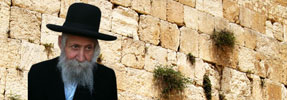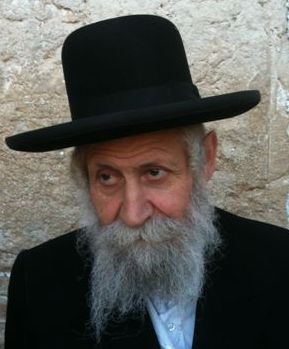 "Every single year, I saw a different man, imbued with a higher level of light." |
Rabbi Rafael-Moshe Luria of blessed memory: A Memorial
On the 27th of Kislev, 5770 -- December 14th 2009, the Community of Israel suffered a great loss: Rabbi Refael Moshe Luria, zt’l, a descendant ofRabbi Yitzchak Luria ("the holy Ari") of 16th century Safed, shortly after he arrived to the Western Wallto pray the Morning Service atdawn as he did daily, had a cardiac arrest and right then and there, in the remnants of our holy Beit haMikdash, returned his soul to his Maker. ...he aimed to include and appeal to all the people of Israel...Rabbi Luria was a SlonimChasid who spent day and night expanding G-d’s call for His people to relate to Him not only as Father and King but also as Soul Companion, thus fulfilling the inner purpose of Creation. Although his voluminous writings were based on the inner wisdom ofKabbalah, still, he aimed to include and appeal to all the people of Israel and to that end, wrote many of his essays so that they could be understood with a simple knowledge of Hebrew. Rabbi Luria’s writings call upon us to yearn for an ever higher bond with the Holy One rather than being content with a simple fulfillment of our duties as delineated in the Torah. Such bond can only be based on a higher knowledge – on trying to learn about G-d’s ways, each according to the intellect s/he was endowed with. As the commentator Ralbag notes, we should not allow ourselves to reach the point in which we have to confess, I sinned in that I did not strive to know G-d as much as possible. We have to go beyond the image of G-dG-d as Father and Provider by trying to understand the purpose of Creation, and give every breathing moment to the struggle of attempting to fulfill it. And as the Rav tells us, we must know within ourselves that our efforts will be crowned with success: He who studies Torah and perceives its meaning out of his effort is only perceiving the Torah’s Inner Light which becomes enclosed within man’s intellect. In contrast, one who receives Torah as a gift is receiving the Surrounding Light which seen with the eyes of the intellect, above the level of the brain’s perception. Furthermore, what may not be contained within the brain’s vessel, he receives as a gift. However, all this is only because at first he struggled in his Torah study and only then finds it as a gift.  One of his students, Dr. Julian Ungar M.D., remarked the Rav’s compassion in holding his reader's hand, and leading the way along on his amazing journey of discovery with him, bringing alive the hardest concepts, moving from the simplepeshat-literal understanding to the deepest secrets of interpretation, and showing how all fit into the plain meaning of the text. In Dr. Ungar’s own words: I will never forget his kindness and sensitivity as a man. He always had time for me at odd times during the night, for I knew he would be up typing away, yet on arrival he made me feel comfortable, important (despite my ignorance) and was a gracious host. He was a prince of a man and generous of spirit and will, in time, be recognized as one of the hidden lights of our generation. Another student shared his struggle in attempting to grow from year to year to a higher level of divine service, and how his effort was boosted when every year, before Shavuot, he came to visit the Rav, in whose case the growth was palpable:There is no question that every single year, I saw a different man, imbued with a higher level of light. Other teachers have shown that upon mourning for the Temple what we are really regretting is a relationship. Rabbi Luria showed how this relationship remains alive today, and how it is up to us to keep it vibrant through the power of prayer: ...the main challenge man faces every day...is to maintain the awareness that he is speaking to the Holy One...The Rokeach points out in his siddur to introduce theAmida prayer that the main challenge man faces every day when [immersed in] intensive prayer is to maintain the awareness that he is speaking to the Holy One ‘mouth to mouth.’ According to the Sages, this means that the person who is praying needs to feel that the Shechinah/Divine Presence is with him at this moment, which does not just mean that he is standing before the King, for the essence of speech is, in a way, mouth-to-mouth [with G-d] just like the commentators have said regarding Moshe, "mouth-to mouth" I speak with him…". Such a statement leaves us with a question, for shouldn’t it say, mouth to ear I speak to him? The answer is that when you are praying or speaking to the Holy One, the Shechinah is also speaking with you, in the form of a kiss involving an exchange of breaths, in the sense that Divine speech is a spirit that becomes enclosed within the [Hebrew] letters [...] And as the Toldos wrote in the Torah section Ekev, in the name of the Baal Shem Tov, […] I have heard from my teacher that we distance ourselves from the Holy One due to our own [misplaced] modesty, for we have such a low self-image that we just do not believe that through our prayer and Torah study we causeshefa-Divine bounty to flow in all the heavenly realms and benefit the angels themselves. If we truly believed this, we would serve our Maker with such joy at all times! […] The idea of ‘mouth to mouth’ is not the same as that of ‘face to face’ – which indicates that the Shechina is before you – but rather, refers to a cleaving of spirits, and as the Rokeach points out, this is a consciousness difficult to attain. And yet, if you recite your Amida prayer with kavana-directed intention, it acquires the quality of a mouth to mouth communication like that of Moses. Upon reaching the Amidah prayer, teaches the Rav, you have ascended from world to world till you have reached Atzilut-Closeness in which man is one with his Maker. At this point your physical person is no longer relevant and you surrender your very being for the sake of this union with the Holy One. Man is created out of the four elements of creation – fire, water, air, and dust – and each one of these has an influence on man’s physical nature. When man’s love for the Holy One reaches the "fiery coals, flame of the Most High" mentioned in Song of Songs, the flames of his love leads to acquire the quality of fire, which is the level of angels. Angels are also made of the four elements but their awe of the Holy One, resulting from their direct contact with Him, is such that the element of fire within them overcomes the others. This quality of bond is the product of prayer, in particular theAmida Prayer. The essence of prayer is that it arouses man to love the Holy One with a love of fiery coals. As a result, man’s physical senses are overcome by the element of fire. In our times, the people of Israel are passionately attached to their Maker in general way, but only the select souls of our time have attained the quality of fire. In the Ultimate Future, however, all Israel will attain this lofty level in which the fire burning within them will overcome the other three elements; as the verse says: "and the Light of Israel will be like fire and his Holy One will be like a flame". This will happen at the time of the Third Temple, which will descend from Heaven made of fire, thus showing us in what way the Redemption will come to us. It will come through the ProphetElijah, who will elevate the people of Israel to a love of G-d in the way of ‘fiery coals,’ and as a result, this quality of bond will also permeate the Temple, may it be speedily and in our time. Yours –- the Menorah– is greater than theirs.And yet, writes the Rav, there is a level which is even loftier – that of light – and we are to attain it in the Ultimate Future. The Holy One thus said to Aaron to placate the latter’s dejection when he saw the offerings of the tribal princes in the inauguration of the Mishkan-Tabernacle: Yours –-the Menorah – is greater than theirs. Namely, the other tribal princes inaugurated the mizbeach-altar in which the offerings are burned, and thus elevated the element of fire over all the others. In contrast, Aaron ignited the Menorah which is permeated by the quality of light and that is even loftier than that of the altar for it is a light that is totally spiritual, not connected to any physical element. As it is predicted: "G-d will be an eternal light for you". Even though Elijah and the Mashiachdescending from Joseph will draw down to Israel the ability to attain a bond with the Holy One imbued with fire, still, the Mashiach descending from David will cause them to attain a bond of light, which is higher than that of fire. We have access to this bond through the Shabbatday. As our Sages question, what was the special blessing given to the Shabbat? And they answer, it was light. The Shabbat is a day in which we all have the ability to ascend to a level of light, beyond that of ‘fiery coals, a flame of the Holy One.’ Rabbi Luria points out that it is up to us to draw down to this world the light of Redemption with the help of our preparation for Shabbat as taught by the Arizal– not only for the Community of Israel – the Rav stresses, but also for each individual who participates in this process to receive the Shabbat Queen. The Rav confided to Rabbi Yoel Benharrouche, of his close students, that he came to the world to transmit by means of his writings the teachings of the Inner Torah that the Arizal was unable to complete due to his death two years before the time that the Ari had been granted in potential. The Rav’s first book on Chanuka is entitled OhrYekarot, which, as he explains, means a precious brilliant light; it is an allusion to the name of its writer, Refael Moshe Luria, for thegematria-numeric value of this name, adding one for the collective in an accepted principle ofgematria-numerology, is the same as that of Ohr Yekarot. And indeed, it was on the third light of Chanuka that the Rabbi Luria’s precious brilliant light went back to the Source. Three days later, we sung in the Hallel of Rosh Chodesh: "Difficult in the eyes of G-d is the death of His devout ones". It is now up to us to retain the reshimu-impression he left behind in his awesome work by undertaking the challenge to bring to fruition the inner purpose of Creation, thus becoming, each one of us, the dira betachtonim-dwelling space below which the Holy One asked of us: "They will make Me a Sanctuary, and I will dwell within them." source: |
No comments:
Post a Comment